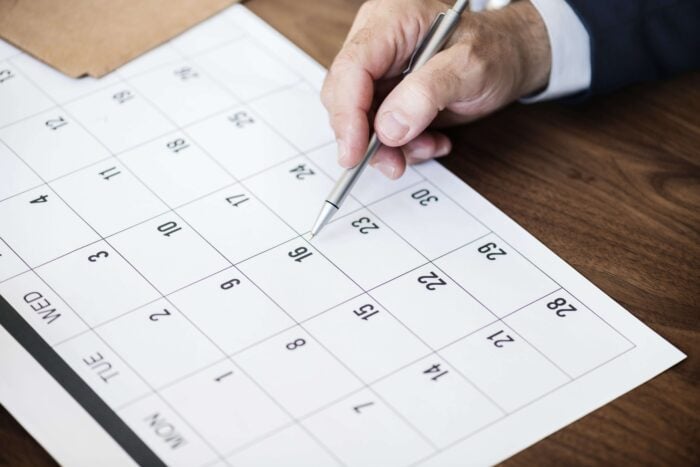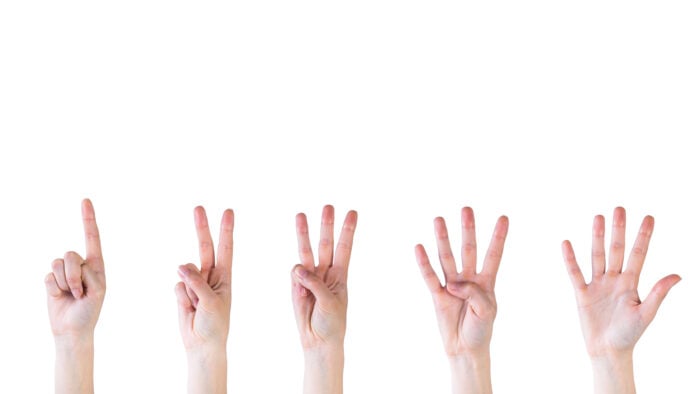155 Core Dutch Words You Need to Know
The Netherlands is truly a great country. Home to the most beautiful bridges, the most gorgeous tulips, the great Dutch culture, and the tallest men in the world, it’s also one of the happiest places on Earth.
When it comes to the Dutch language, however, many people feel intimidated. But should they?
By learning a few core terms (Dutch words that make up the majority of everything Dutch people say on a daily basis), you should be able to understand the main ideas in an informal conversation.
Below, you will find a list of essential Dutch words that you should learn before you travel to Amsterdam or Rotterdam.
Table of Contents
→Sign Up Now: Free Trial Dutch Lesson With a Native Speaker Teacher!←
Dutch Greetings
It’s a well-known fact that most Dutch people have a great level of English and that they are usually willing to use language skills to talk to visitors.
For this reason, it would be easy to conclude that there is no practical reason to learn Dutch words before visiting the Netherlands, but we firmly believe that learning a few greetings is a nice courtesy towards your hosts, as it shows them you appreciate their language and culture. These are the ones you’ll need for sure!
- Hallo — Hello
- Hoi — Hi
- Goedemorgen— Good morning (often shortened to morgen)
- Goedenmiddag— Good afternoon (often shortened to middag)
- Goedenavond— Good evening
- Dag— Bye
- Totziens — See you later
A Few Notes
Dag literally means “day” (as in “good day”), which makes it one of the most confusing Dutch words for goodbye. However, it’s the most universal greeting of its kind and you can use it at any time and place.
Regarding tot ziens, this greeting is used figuratively by restaurant or shop workers as you leave. It’s cheerful, yet suitable for people you don’t know.

Aerial view of Rotterdam – Water photo created by wirestock – www.freepik.com
Body Parts
Words for body parts play a huge role in our language. Whether we are asking someone to give us a hand or telling a friend to break a leg before a match, we use body-related language all the time. The Dutch language is no different.
These Dutch words have a huge range of uses that go way beyond biology lessons and doctor appointments, as they appear in lots of idioms and metaphorical phrases.
Here is a list of Dutch words for body parts that will come extremely hand-y.
- lichaam— body
- voet— foot
- hand— hand
- arm— arm
- schouders— shoulders
- hoofd— head
- ogen— eyes
- gezicht— face
- been— leg
- tenen— toes
- mond— mouth
- neus— nose
- knie— knee
- oor— ear
- tand— tooth
- hals— neck
- rug— back
- buik— stomach
Dutch Idioms Involving Body Parts
1. Eenfrisseneus halen
Literal translation: getting a fresh nose
Meaning: Getting some fresh air
2. Hij heeft lange tenen
Literal translation: To have long toes
Meaning: To be very irritable
3. De schouders ophalen
Literal translation: Raising your shoulders
Meaning: Not caring
Months & Days of the Week
Have you already booked your flight to Amsterdam? Then you must learn the Dutch words to say and write dates in the Dutch language. Whether you are looking forward to an Armin Van Buuren concert or a romantic dinner date in Rotterdam, you won’t want to ruin the night of a lifetime by reading a date backward.
But before moving we can teach you the Dutch words to write dates, we first have to tell you the names of the days of the week and their common abbreviations. Bear in mind that none of them are capitalised.
Days of the Week in Dutch
- maandag(ma.) — Monday
- dinsdag(di.) — Tuesday
- woensdag(wo.) — Wednesday
- donderdag(do.) — Thursday
- vrijdag(vr.) — Friday
- zaterdag(za.) — Saturday
- zondag(zo.) — Sunday
Months of the Year in Dutch
Few Dutch words are more useful than words for months. They allow you to speak about birthdays, inquire about zodiac signs, and make plans and arrangements.
The good news is that about a third of them are written exactly the same way as in English.
Just like the days of the week, the names of the months are never capitalised.
- januari(jan.) — January
- februari(febr.) — February
- maart(mrt.) — March
- april(apr) — April
- mei— May
- juni— June
- juli— July
- augustus(aug.) — August
- september(sep.) — September
- oktober(okt.) — October
- november(nov.) — November
- december(dec.) — December
How to Write the Date in Dutch
Writing a date in Dutch poses no major difficulties once you know the Dutch words for days of the week and months. All you have to do is put them together in the correct order, and voilá!
The standard date format in the Dutch language, like in most of European languages, is [day] [month] [year].
This means Dutch people would write Wednesday, September 13, 2021 as woensdag 13 september 2021.
Wan to make it shorter? Write wo. 13 sep. 2021, or use the numerical format: 13-09-2021.
Numbers
Somebody’s just asked you how old you are in a bar.
A shop assistant is telling you how much you will spend on that nice sweater.
A waiter wants to make sure you’ve asked for the right number of pints.
What do all these situations have in common?
You guessed right.
You will need to learn Dutch numbers in order to avoid communication problems in all of them.
We have included the Dutch words for both the cardinal numbers (for dates, age, prices and quantity), and the ordinal ones (for dates and items that follow a specific order).
| Numeral | Cardinal (one, two, three etc) | Ordinal (first, second, third, etc) |
|---|---|---|
| 0 | nul | nulde |
| 1 | één | eerste |
| 2 | twee | tweede |
| 3 | drie | derde |
| 4 | vier | vierde |
| 5 | vijf | vijfde |
| 6 | zes | zesde |
| 7 | zeven | zevende |
| 8 | acht | achtste |
| 9 | negen | negende |
| 10 | tien | tiende |
| 11 | elf | elfde |
| 12 | twaalf | twaalfde |
| 13 | dertien | dertiende |
| 14 | veertien | veertiende |
| 15 | vijftien | vijftiende |
| 16 | zestien | zestiende |
| 17 | zeventien | zeventiende |
| 18 | achttien | achttiende |
| 19 | negentien | negentiende |
| 20 | twintig | twintigste |
| 21 | eenentwintig | eenentwintigste |
| 22 | tweeëntwintig | tweeëntwintigste |
| 23 | drieëntwintig | drieëntwintigste |
| 24 | vierentwintig | vierentwintigste |
| 25 | vijfentwintig | vijfentwintigste |
| 26 | zesentwintig | zesentwintigste |
| 27 | zevenentwintig | zevenentwintigste |
| 28 | achtentwintig | achtentwintigste |
| 29 | negenentwintig | negenentwintigste |
| 30 | dertig | dertigste |
| 40 | veertig | veertigste |
| 50 | vijftig | vijftigste |
| 60 | zestig | zestigste |
| 70 | zeventig | zeventigste |
| 80 | tachtig | tachtigste |
| 90 | negentig | negentigste |
| 100 | honderd | honderdste |
| 1,000 | duizend | duizendste |
| 10,000 | tienduizend | tienduizendste |
| 100,000 | honderdduizend | honderdduizendste |
| 1,000,000 | (een) miljoen | (een) miljoenste |
Professions
Imagine you go to a bar and you meet someone you like… Wouldn’t it be nice to be able to say more than just your name and your age?
What about asking them what they do for a living? Learn the Dutch words for jobs and professions and get ready to engage in a more meaningful conversation.
- boer— farmer
- ingenieur— engineer
- advocaat— lawyer
- ontwerper— designer
- apotheker— pharmacist
- loodgieter— plumber
- elektricien— electrician
- monteur— mechanic
- kapper— barber
- schoonheidsspecialist— beautician
- schoenmaker— shoemaker
- verkoper— salesperson
- klerk— clerk
- tuinman— gardener
- Winkelassistent — shop assistant
- arts— doctor
- docent— teacher
- Stewardess— flight attendant
So, a typical conversation about this topic may go:
– Wat voor werk doe je? (What do you do for a living?)
– Ik ben een ingenieur (I’m an engineer)
Animals
Are you an animal lover? Are you planning to go to a natural reserve once you arrive in the Netherlands? Learn a few Dutch words for animals and show off your knowledge every time you see one.
- hond— dog
- kat— cat
- giraffe— giraffe
- krokodil— crocodile
- konijn— rabbit
- schildpad— turtle
- hagedis— lizard
- aap— monkey
- hert— stag
- doe— doe
- leeuw— lion
- tijger— tiger
- zebra— zebra
- dolfijn— dolphin
- haai— shark
- walvis— whale
- wolf— wolf
Common Adjectives in Dutch
Going back to the bar scene… Wouldn’t it be great to ask someone about their personality so you can see how compatible you both are? The Dutch words below are very handy if you want to get to know someone at a deeper level.
- verlegen— shy
- uitgaand— outgoing
- slim— clever
- vriendelijk— friendly
- ambitieus— ambitious
- genereus— generous
- lui— lazy
- hardwerkend— hardworking
- energiek— energetic
- avontuurlijk— adventurous
- stil— quiet
- spraakzaam— talkative
Frequently Asked Questions About the Dutch Language
What Is the Longest Dutch Word?
At 53 letters, the word Kindercarnavalsoptochtvoorbereidingswerkzaamhedenplan, meaning “preparation of activities for a children’s carnival procession”, made it into the 1996 Guinness Book of World Records for being the longest word in the Dutch language.
What Are the Hardest Dutch Words?
According to a recent survey, Meteorologisch (meteorological) is the most difficult word to pronounce. With 34% of the votes, it was a narrow winner over defibrilleren (defibrillate), which took 31%.
→Sign Up Now: Free Trial Dutch Lesson With a Native Speaker Teacher!←
Want to go beyond the word level and start working on your speaking skills? Learn Dutch with a qualified native tutor for free! Explore our Free Trial Dutch Classes and get your first lesson at no cost. We’ll pair you up with a professional teacher who will prepare a course tailored to your needs and learning style. Contact us on our website to get started!



